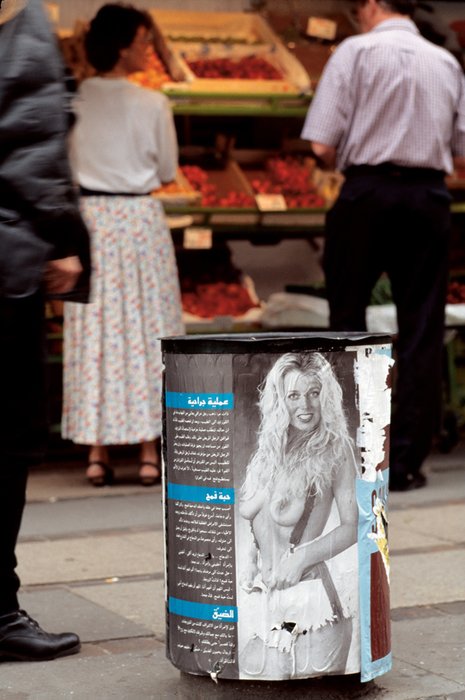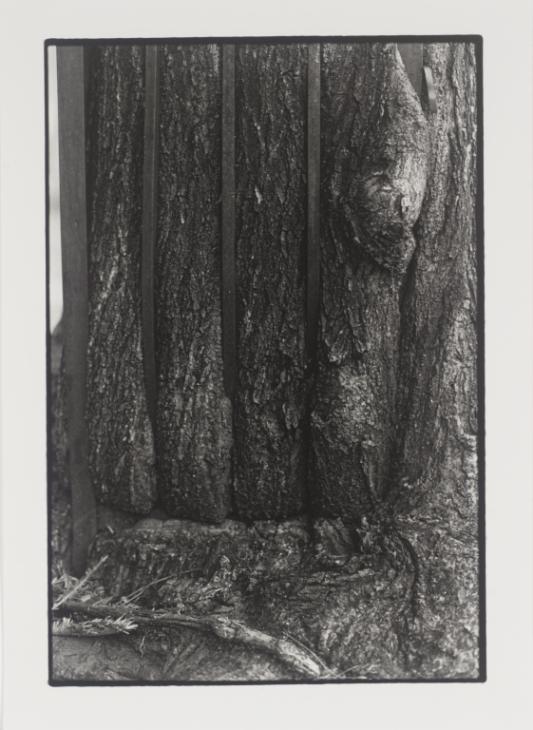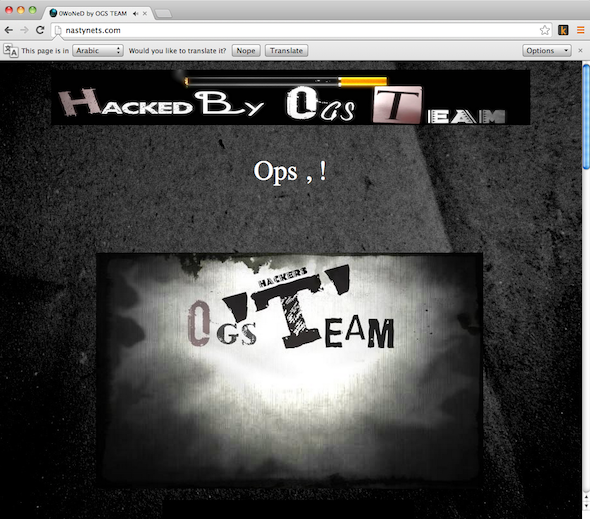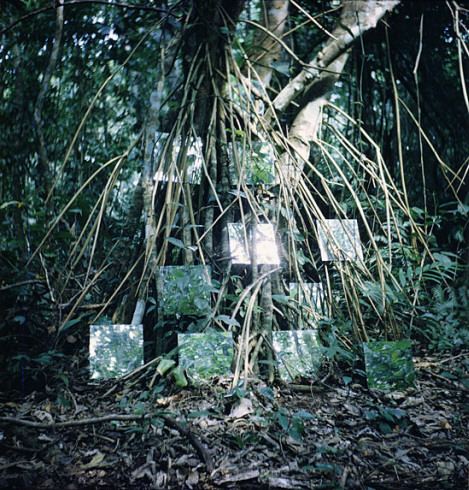
Syntax, like
government, can only be obeyed. It is
therefore of no use except when you
have something particular to command
such as: Go buy me a bunch of carrots.
— John Cage[i]
Translation is the ultimate humanist gesture. Polite and reasonable, it is an overly cautious bridge builder. Always asking for permission, it begs understanding and friendship. It is optimistic yet provisional, pinning all hopes on a harmonious outcome. In the end, it always fails, for the discourse it sets forth is inevitably off-register; translation is an approximation of discourse — and, in approximating, it produces a new discourse.
Displacement is rude and insistent, an unwashed party crasher — uninvited and poorly behaved — refusing to leave. Displacement revels in disjunction, imposing its meaning, agenda, and mores on whatever situation it encounters. Not wishing to placate, it is uncompromising, knowing full well that through stubborn insistence, it will ultimately prevail. Displacement has all the time in the world. Beyond morals, self-appointed, and taking possession because it must, displacement acts simply—and simply acts.
Displacement never explains itself, never apologizes. In 2010 at Columbia University's "Rethinking Poetics" conference, the Mexican-American poet Mónica de la Torre, in the middle of her presentation, broke out, full on, for ten minutes entirely in Spanish, leaving all those who pay lip service to multilingualism and diversity angry because they couldn't understand what she was saying. De la Torre thereafter resumed her talk in English, never mentioning her intervention. No symbols where none intended. Comprehension is optional; displacement is concretely demonstrative.
Globalization engenders displacement. People are displaced, objects are displaced, language is displaced. In a global circulatory system, there is no time — and certainly not enough energy — for tracing the long supply chains that lead to understanding. Instead, there is a blinkered lack of understanding, ultimately yielding to resignation. Nobody seems to notice anymore. Advertising signs in ballparks are presented in foreign languages, completely incomprehensible to the vast majority of the meatspace audience, addressing instead the far-flung televised, webcast audience; bypassing the local for the unseen, the unknown, the elsewhere.

Jens Haaning, Arabic Jokes, 1996. Poster for public spaces in Copenhagen.
Translation is quaint, a boutique pursuit from a lost world; displacement is brutal fact. Translation is slow food: a good meal with friends, in a warm environment, a bourgeois luxury; displacement is not being able to read the menu in fluorescent-lit refractivity that appeared out of nowhere onto Main Street. Translation is the faux-nostalgia for the LP; displacement is the torrent-laced, mislabeled MP3. Displacement is a four-dimensional object, at one expanding and contracting, unified while exploding, devouring everything in its sight.
"Syntax" said John Cage, "is the arrangement of the army."[ii] Legislated by the laws of grammatical concord, syntax sets chains of linguistic assimilation into motion, a situation whereby words are forced to adapt to words surrounding them, formally and sonically. Cage views language as being expressive of a societal politic, and therefore ripe for contestation: "This demilitarization of language is conducted in many ways: a single language is pulverized; the boundaries between two and more languages are crossed; elements not strictly linguistic (graphic, musical) are introduced; etc. Translation becomes, if not impossible, unnecessary."[iii] Shattering language into pieces as a political act. Picking them up and putting them back together the wrong way as an act of liberation. Creative misuses of language like homophonic translations and mondegreens as models of playful anarchy. Question linguistic structures, question political structures.
Computer networks are also arrangements of the army, but their logic is already that of displacement, pulverization, crossed boundaries. As citizens of these networks, data packets are by nature both stable and nomadic; they offer a parallel for the movement of bodies in space. Moving in bulk, data packets course through networks like charter groups on holiday tours or Bangladeshi workers trundled off to UAE labor camps. Buffered and queued — resulting in variable delays and throughput depending on the network's capacity and the traffic load — they are dispatched through labyrinths of nodes, borders, switches, gateways, routers, and immigration checkpoints. Aping the mechanics of the RAID drive, displacement spits its subjects across the globe, redundantly segmenting and replicating them — one part can easily be swapped out for another — thereby minimizing chances for loss while increasing chances for totality.
We have faith that data packets will constitute themselves as promised but often that proves to be false: the high-def video we were seeking is merely a cellphone grab, held up shakily for ninety minutes at a screen in a dim theater. In our computational ecosystem, these spurious artifacts take on the characteristics of an unwanted guest. We invite someone for dinner, but they don't behave the way we wish: perhaps they're unkempt, or rude — we toss them out. But sometimes they sneak in unawares. The malware, keylogger, or Trojan horse that surreptitiously slips in under the guise of a pirated program, movie, or link, settles in, becoming a part of the household. Sometimes we have no choice but to accommodate our displaced guest.
Displacement, on a larger scale, is no different. Acid rain is displaced weather. Petroleum is displaced prehistoric life. Nuclear waste from Fukushima washing up on the shores of California is displaced industry. Melting polar ice caps are displaced Ice Age. The Great Pacific Garbage Patch is displaced geography, a displaced landmass comprised of displaced rubbish. These riotous amalgamations of displaced color and form — accidental collaborations between nature and man — are permanent reefitecture for fishes.
Plastic bags twisted around branches of trees become year-round foliage, transforming bare winter oaks into everblues and everreds, technicolor displays that make New England Octobers pale by comparison. Seasonal narratives take on a rouge character: older bags, their shape deformed by sunlight and rough weather, disintegrate into fluttering flaglike shreds before being blown off the trees by gales. Those same gales attach fresh bags to the trees, blossoming anew each day.
A tree grows to devour a metal grate that once served as its protector. The tree now becomes the guardian of the grate, swallowing it whole, nestling it deep within its core. A state of détente: the tree doesn't die. Instead, it adapts like the man who, in midlife after complaining of stomach pains, discovers that he has been carrying his conjoined twin unbeknownst to him within his belly all these years, fetus in fetu. Displaced tumors as fetuses; displaced fetuses as tumors.

Zoe Leonard, Tree + Fence, 6th St. (Close-up) (1998, printed 1999).
In Hong Kong after a typhoon, 150 tons of microplastic nurdles were blown into the sea, so small and numerous that they could never be gathered. They washed ashore and became a part of the beach; beachgoers now prefer nuzzling these new spongy, pliant grains between their toes to the natural sand. PCBs are displaced toxins, permanently enmeshed in the river's mud. Removing them would only stir up their noxiousness, so they slumber in the riverbed undisturbed for eternity. A part of the river's ecosystem for so long, it's hard to remember a time when they weren't there.
Retained foreign objects are displaced industrial items which have become lodged inside of living bodies, coexisting with organs and flesh for years without incident or detection. A bullet shot into a boy's face remains comfortably embedded for the next eighty years. The bullet's heat sterilizes it; once lodged, infection is impossible. Unnoticed, life goes on. Metal melds with bone: plates in legs, silver in teeth. A teenager swallows a pen, where it remains in her stomach for a quarter of a century. Finally removed, it still writes. Surgical tools left in bodies are known as retained surgical items. One man is found with sixteen of them inside him. Doctors remark on his body's amazing ability to get used to things.
Displacement is modernism for the 21st century, a child of montage, psychogeography, and the objet trouvé. Appropriation is the engine of displacement, mechanically moving unimpeded toward its goal. Trading in binaries — this either can or cannot be appropriated — appropriation eschews messy questions of morality, ethics and nuance. A boundless annexing machine, it sucks indiscriminately. The consequences are low — transnational, networked, fast-moving and ubiquitous, terrestrial law can't begin to compete. Instead, appropriation abides by the law of the network, which is the law of open architecture, of select-all. Flexible and cunning, it always finds a loophole.

Screen capture of nastynets.com.
The digital ecosystem is a decontextualizing machine, wrenching pieces from their constituent structures and flinging them across the globe. In this context of no context, meaning becomes pliant. Detached from their original circumstances, artifacts aren't devoid of meaning; instead, they acquire new meanings, nestled into new frameworks. By dismantling the precisely constructed framing apparatuses that uphold any ethos, poetic, or politic, appropriation effectively knocks the legs out from under ideology, rendering the subject neutered, little more than a deflated bag of bones.
Appropriation is a cipher, cobbling together bits and pieces willy-nilly, resulting in bizarre Frankensteinian artifacts: iPhones cloned with TV antennas and USB ports; PDFs of books with pages pieced together from various editions, in various languages, editions, fonts, and font sizes; some pages are upside down, others are missing entirely; Hollywood blockbusters with hard-coded Telgu subs; Tollywood blockbusters with singed-in Urdu subs. There are ten Harry Potter books in the Chinese series as opposed to the seven penned by J.K. Rowling. Appropriation thrives on provisionality, the craft of the kludge — it's ugly but it works. Quantity over quality: trawl in deep enough waters with a wide enough net and you're bound to catch something. Take it now. Sort it later. Or never sort it. Compile & stockpile. Redistribute & resell.
Sampling and remixing are based on borrowing. Borrowing is translation. Polite and neighborly, it involves exchange and social discourse, agreed upon terms and conditions. Sampling is the art of mindful recontextualization. You sample a riff of a James Brown song, building your song off it; you don't simply re-present the whole song and call it your own. Likewise, remixing bears the hand of the mixer, marked by an individual aesthetic. Remixing is a game of telephone, a conversation, mindful of the version which proceeded yours and the version which will follow. "I always tried to bring something fresh to anything that I used," said Jimmy Page, commenting on his reworking of preexisting material. "I always made sure to come up with some variation."[iv] Appropriation, on the other hand, is effortless and brutal, dumbly picking things up whole and dropping them whole into new situations. Anonymous and authorless, displaced versions are replicas and knockoffs, indistinguishable from one another except in metaphysical ways: conceptualization, contextualization, and distribution.
Robert Smithson didn't make paintings of the sky; instead, by reflecting it in a mirror, he displaced it, fusing it with the earth, dropping squares of blue into seas of green. Blazing azure one day, smoggy grayish-yellow the next, Smithson's gestures were at once formal color studies, quiet mediations on nature, and political statements on ecology. The mirror is a displacement machine which appropriates all that passes before it. A pre-programmed automaton, the mirror employs no judgment or morals, indiscriminately displaying all that passes before it. Reflect something emotional, the mirror becomes emotional. Reflect something political, the mirror becomes political. Reflect something erotic, the mirror becomes erotic. The mirror works around the clock, reflecting a dark room all night long when its inhabitants are sleeping, or an empty apartment all day long when its inhabitants are at work. Like its cousin the surveillance camera, the mirror displays scads of dark data, but unlike the NSA, the mirror has no memory: every image passing across its surface is ephemeral. Great crimes are committed before mirrors; no one is ever the wiser. If this mirror could talk... The mirror, then, is closer to a movie screen than CCTV, a surface upon which images are projected/ reflected in reverse. But unlike the movie screen, the mirror never goes dark. Smash the mirror, disperse the image. Toss the pieces in the trash, they continue to dumbly reflect.

Robert Smithson, from the series Yucatan Mirror Displacements (1969).
The displaced text is a mirror, taking on the hue of whatever it is placed near. Displaced authorship solely consists of determining what the text will reflect. Reflect something emotional, you have written an emotional text. Reflect something political, you have written a political text. Reflect something erotic, you have written an erotic text. Mirrored writing is not writing: it is copying, moving, and reflecting. Editing is moving. Want to alter your text? Move it elsewhere. The displaced text's natural environment is in the network. Born of copy-and-paste, everything about the displaced text is circumstantial and temporary. Ricocheting across the networks, the displaced text restlessly replicates, morphs, and self-distributes. The text assumes the affect of a mirror, offering a curious kind of utopianism which should not be confused with nihilism except that, like all utopias, it indirectly advocates a tabula rasa; like most utopias, it has no concrete expression.
The displaced text is always recycled. Recycled language is politically and ecologically sustainable, promoting reuse and reconditioning as opposed to the manufacture and consumption of the new, counteracting rampant global capitalist consumption by admitting that language is not able to be owned or possessed, that it is a shared and endlessly abundant resource. The digital ecosystem with its replicative and mimetic processes yields limitless resources — too much is never enough.
Yet — and this is where it gets interesting — the displaced text's entwinement with the latest technology, its scraping, warehousing, and hoarding of data, its celebration of baroque excess and fetishizing of waste, aligns it with nefarious global capitalist tendencies. In addition, there's an imperialistic aspect to it, a colonizing imperative. Like a virus spreading rapidly across networks, it threatens to take on the character of a huge multinational monster. All of these contradictions are part of the discourse of displacement, inseparable from its processes, production, and reception. The limits of the network are the limits of its world.
Displacement is a shift away from linear models of political orientation: neither left nor right, progressive nor reactionary, but swirling and sideways. The right tries to seal borders and legislate displacement out of existence, oblivious to the flows that whirl freely around it. Meanwhile, the left still holds out hope against hope for translation — can't we all just get along? Displacement, instead of responding to difference with understanding and consideration, responds to difference by swallowing it whole.
Odd things appear: retained foreign objects. Things that I don't understand. Things I didn't ask for.A system update will, unbeknownst to me, drop things into the midst of my environment. I have no idea they are there. I panic and wonder whether I can go back to an earlier version. I can't. Notwithstanding that, I begin to toy with the idea of going back to the previous system, the one I knew, the one I was comfortable in. There is no going back. I struggle, I whine, I eventually adapt myself to it; the displacement, once obtrusive, becomes the new normal — at least until the next upgrade. I don't move them — generally they can't be moved — so I live with them. I learn to accept them, even though I might not understand them. My computer has thousands of such displaced items on it. I can't translate them. The song that shows up in iTunes. I can't tell you where it came from. I wish I knew. The song has no identifying information, no ID3 tags, no provenance. But I like it. I tame it by tagging it, domesticate it by filing it on my hard drive. It becomes mine.
[i] John Cage, M: Writings ’67–’72 (Middletown: Wesleyan University Press, ) from Foreword, unpaginated.
[ii] John Cage, M: Writings ’67–’72 (Middletown: Wesleyan University Press, ) from Foreword, unpaginated.
[iii] John Cage, M: Writings ’67–’72 (Middletown: Wesleyan University Press, ) from Foreword, unpaginated.
[iv] Vernon Silver, "Stairway to Heaven: The Song Remains Pretty Similar," Businessweek, May 15, 2014 <http://www.businessweek.com/articles/2014-05-15/led-zeppelins-stairway-to-heaven-vs-dot-spirits-taurus-a-reckoning>, accessed May 28, 2014


It seems too easy for a native English speaker living in New York to say that translation is quaint